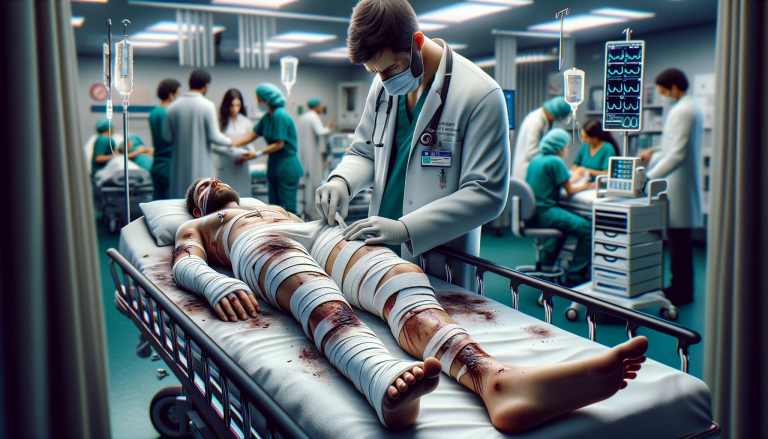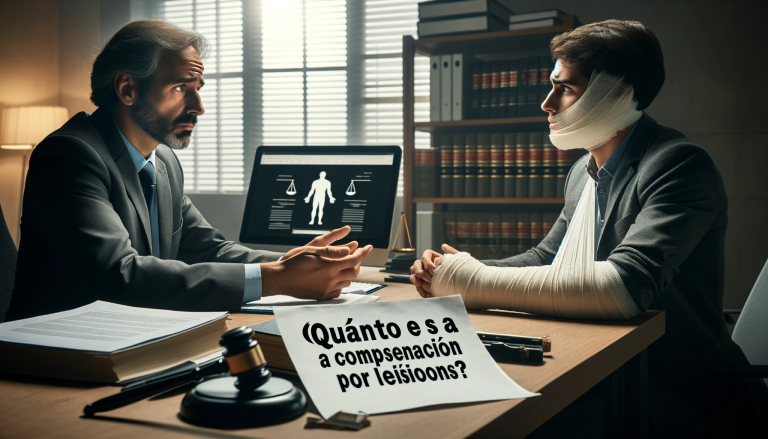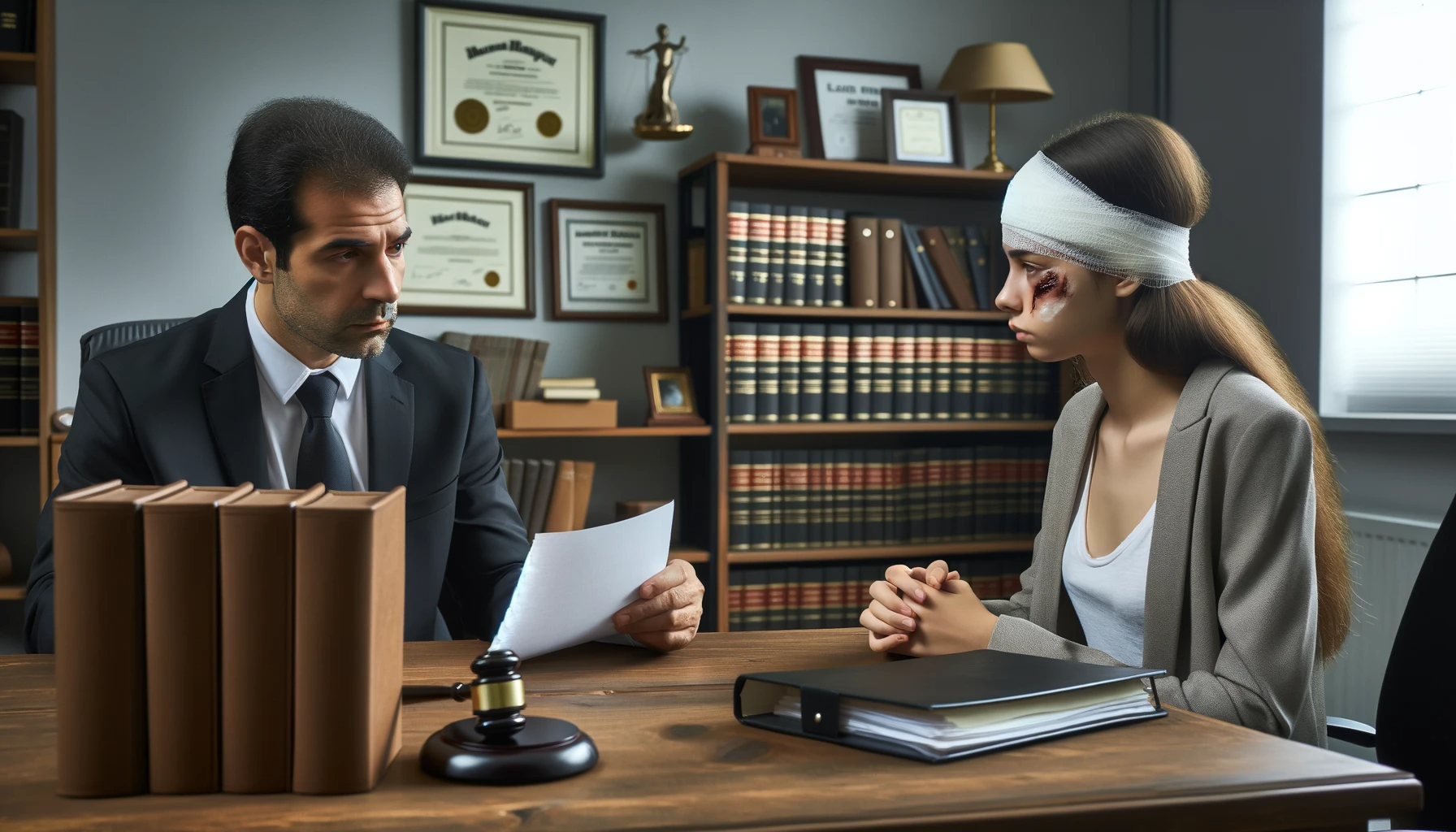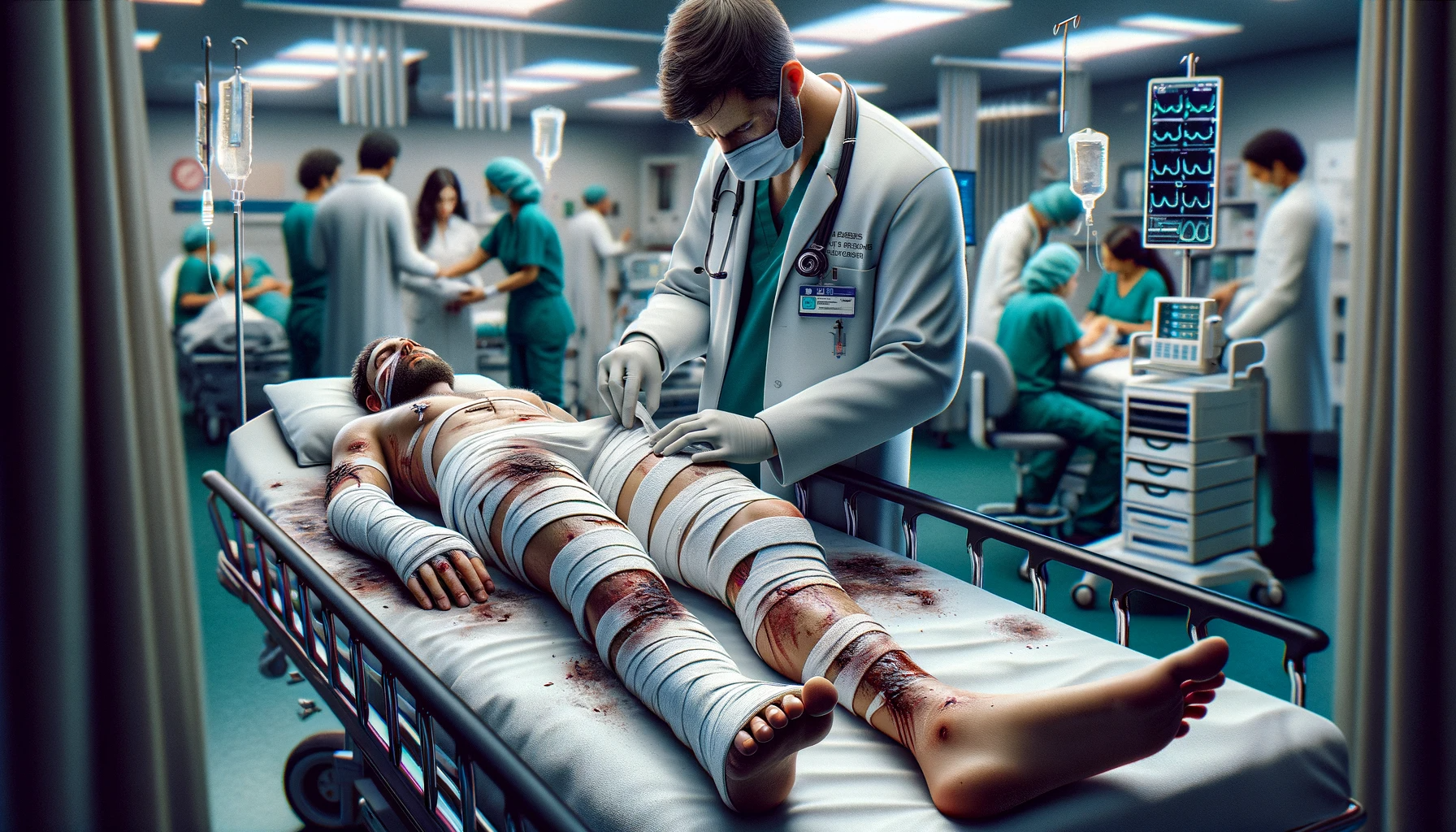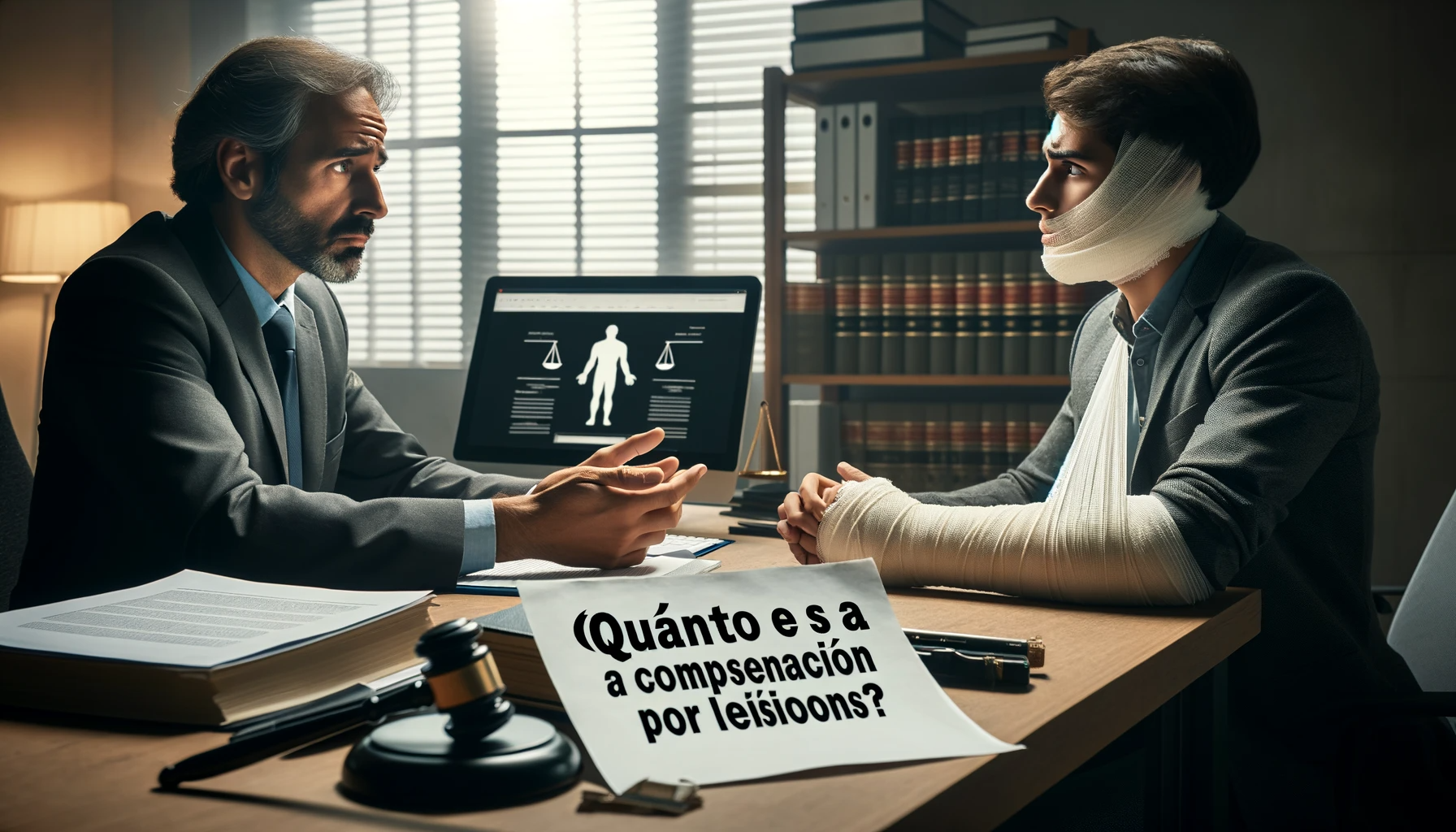Introduction
Auto accidents can be devastating, and when they result in brain injuries, the consequences are often severe and long-lasting. Understanding the legal resources available can help victims navigate this challenging time and ensure they receive the support and compensation they deserve.
Concussion
A concussion is a mild traumatic brain injury that affects brain function. While symptoms are usually temporary, they can include headaches, confusion, and memory problems.
Contusion
A contusion is a bruise on the brain caused by a direct impact. It can lead to swelling and bleeding, requiring medical intervention.
Penetrating Injury
Penetrating injuries occur when an object pierces the skull and enters the brain. These injuries are often severe and require immediate medical attention.
Diffuse Axonal Injury
This type of injury results from severe shaking or rotational forces, causing widespread damage to brain cells. It is often seen in high-impact accidents and can lead to long-term impairments.
Ensuring Safety
The first priority after an accident is to ensure the safety of everyone involved. Move to a safe location if possible and call emergency services.
Seeking Medical Attention
Even if you feel fine, it's crucial to seek medical attention immediately.
Brain injuries may not show symptoms right away but can be life-threatening if untreated.
Documenting the Scene
Take photos, gather witness statements, and record details about the accident scene. This documentation will be vital for your legal case.
Reporting the Accident
File a police report and inform your insurance company about the accident. This ensures an official record of the incident.
Brain injuries can manifest through a variety of symptoms, which may be physical, cognitive, or emotional in nature. Recognizing these symptoms early can be crucial for seeking appropriate medical intervention and improving outcomes.
Physical Symptoms
Physical signs of brain injuries include headaches, dizziness, nausea, and fatigue. These symptoms can appear immediately after the injury or develop gradually over time. In severe cases, there may be loss of consciousness, seizures, vomiting, and problems with balance and coordination. Sensory issues such as blurred vision, ringing in the ears, and sensitivity to light or sound can also occur. It's important to monitor any physical changes closely and seek medical attention if symptoms worsen or new symptoms appear.
Cognitive Symptoms
Cognitive symptoms can range from confusion and memory problems to difficulty concentrating and processing information. Individuals with brain injuries may experience difficulty remembering new information, feel mentally "foggy," or find it hard to follow conversations or instructions. Other cognitive issues can include slowed thinking, difficulty with problem-solving, and challenges in organizing thoughts or tasks. These symptoms can significantly impact daily life, work, and social interactions.
Emotional and Behavioral Symptoms
Brain injuries can also impact emotional and behavioral health, leading to mood swings, depression, anxiety, and changes in personality. Individuals may become more irritable, experience sudden outbursts of anger, or feel unusually sad or anxious. Changes in sleep patterns, such as insomnia or excessive sleepiness, are also common. Some people may exhibit impulsive behavior or struggle with emotional regulation, which can affect their relationships and overall quality of life.
The Role of Medical Professionals
Proper medical care is essential for diagnosing and treating
Brain injuries. Medical professionals play a critical role in managing these injuries and guiding patients through recovery.
Emergency Room Care
Initial treatment often occurs in the emergency room, where doctors can assess the severity of the injury and provide immediate care. This may include performing imaging tests such as CT scans or MRIs to detect any bleeding, swelling, or other abnormalities in the brain. Emergency room staff can stabilize the patient, manage acute symptoms, and determine whether hospitalization or further specialist care is necessary.
Neurological Assessments
Neurologists conduct detailed assessments to determine the extent of brain damage and plan further treatment. These assessments may involve a series of tests to evaluate cognitive function, motor skills, sensory perception, and reflexes. Neurologists can also identify specific areas of the brain that are affected and monitor the patient's progress over time. Based on their findings, they can recommend a tailored treatment plan to address the patient's unique needs.
Rehabilitation Services
Rehabilitation may include physical therapy, occupational therapy, and cognitive rehabilitation to help patients recover and regain function. Physical therapy focuses on improving strength, coordination, and mobility. Occupational therapy helps patients relearn daily activities and develop strategies to cope with their limitations. Cognitive rehabilitation targets memory, attention, and problem-solving skills. Speech therapy may also be included if the injury affects communication abilities. The goal of rehabilitation is to maximize independence and quality of life, supporting patients as they adapt to changes and rebuild their lives.
Legal Rights After a Brain Injury
Brain injuries can have a profound impact on your life, not only physically and emotionally but also financially. Understanding your legal rights and options can help ensure you receive the compensation you deserve to cover your medical expenses, lost wages, and other damages.

Understanding Your Rights
Victims of brain injuries have the right to seek compensation for their medical expenses, lost wages, and other damages. This includes the cost of immediate medical care, ongoing treatment, rehabilitation, and any future medical needs. You may also be entitled to compensation for pain and suffering, emotional distress, and loss of quality of life. If the injury was caused by someone else's negligence or wrongdoing, you have the right to hold that party accountable through legal action.
The Importance of Legal Representation
A knowledgeable lawyer can help navigate the complex legal process, ensuring your rights are protected and you receive fair compensation. Legal representation is crucial because insurance companies and opposing parties often have their own legal teams working to minimize your claim. An experienced lawyer will understand the intricacies of brain injury cases and be able to build a strong case on your behalf, negotiating settlements or taking the case to court if necessary.
Choosing the Right Lawyer
Selecting the right lawyer is a critical step in ensuring the success of your claim. Here are key factors to consider:
Select a lawyer who specializes in brain injury cases, as they will have the expertise needed to handle your claim effectively. Specialized lawyers are familiar with the medical and legal complexities of brain injuries and can better advocate for your specific needs. They understand the long-term impacts of such injuries and can ensure that all potential costs and damages are considered in your claim.
Experience and Track Record
Look for a lawyer with a proven track record of success in similar cases. Experience matters when dealing with complex injury claims, as seasoned lawyers are more likely to anticipate challenges and know how to address them. Research their past cases and outcomes to ensure they have successfully handled brain injury claims and secured significant compensation for their clients.
Consultation Process
Schedule consultations with potential lawyers to discuss your case and determine if they are the right fit for you. During these consultations, ask about their experience with brain injury cases, their approach to handling claims, and their fee structure. This is also an opportunity to assess their communication style and ensure you feel comfortable working with them. The right lawyer should listen to your concerns, answer your questions, and provide clear guidance on the next steps.
Filing a Claim
Filing a claim is a crucial step in seeking compensation for your brain injury. Here’s what you need to know:
Types of Claims
You can file a
Personal injury claim or a workers' compensation claim, depending on the circumstances of your accident.
Personal injury claims are typically filed when the injury results from another party’s negligence, such as in
Car accidents, slip and falls, or medical malpractice. Workers' compensation claims are filed when the injury occurs at the workplace or during work-related activities.
Necessary Documentation
Gather medical records, accident reports, witness statements, and any other relevant documents to support your claim. Documentation is essential for establishing the extent of your injuries and the circumstances surrounding the accident. Detailed records of your medical treatment, including diagnoses, treatments, and prognoses, will help substantiate your claim for compensation.
Timeline for Filing
Be aware of the statute of limitations for filing a claim in your state, as missing this deadline can bar you from seeking compensation. The statute of limitations varies by state and type of claim, so it’s important to act promptly. Your lawyer can provide guidance on the specific deadlines applicable to your case and ensure all necessary paperwork is filed on time.
Insurance Companies and Settlements
Dealing with insurance companies is often a significant part of the claim process. Here’s how to navigate it effectively:
Dealing with Insurance Adjusters
Insurance adjusters may try to minimize your claim. It's essential to have legal representation to handle negotiations and ensure a fair settlement. Adjusters work for the insurance company and aim to reduce the amount paid out on claims. Having a lawyer advocate for you helps level the playing field and ensures your interests are represented.
Evaluating Settlement Offers
Carefully evaluate any settlement offers with your lawyer to ensure they cover all your current and future expenses related to the injury. Settlement offers can be tempting, especially if you’re facing financial strain, but they often do not account for the full extent of your damages. Your lawyer will help you assess the adequacy of the offer and advise whether to accept it or negotiate for a better deal.
Negotiating Fair Compensation
Your lawyer will negotiate on your behalf to secure the best possible compensation, considering the full impact of your brain injury. This includes not only immediate medical costs and lost wages but also long-term care needs, rehabilitation, and non-economic damages like pain and suffering. Effective negotiation requires a thorough understanding of the value of your claim and the ability to present compelling evidence to support it.
Court Proceedings
When a settlement cannot be reached through negotiation, your case may proceed to court. Understanding the steps involved in court proceedings can help you feel more prepared and confident throughout the process.
Preparing for Court
If a settlement cannot be reached, your case may go to court. Your lawyer will prepare you for what to expect during the trial. This preparation includes gathering and organizing all necessary evidence, identifying and briefing witnesses, and developing a compelling argument to present in court. Your lawyer will also guide you through court procedures, etiquette, and what to expect during testimony. Mock trials or rehearsals may be conducted to help you feel more comfortable and confident when presenting your case.
The Trial Process
The trial involves presenting evidence, witness testimony, and arguments from both sides. Your lawyer will advocate for your rights throughout the process. The trial process typically begins with opening statements from both the plaintiff’s and defendant’s attorneys. This is followed by the presentation of evidence, including documents, photographs, and other physical evidence, as well as witness testimony. Both sides will have the opportunity to cross-examine witnesses. After all evidence has been presented, closing arguments are made, summarizing the key points and urging the jury or judge to rule in their favor. The judge or jury will then deliberate and reach a verdict.
Post-Trial Steps
After the trial, there may be additional steps such as appeals or enforcement of the judgment. Your lawyer will guide you through these as well. If the verdict is in your favor, your lawyer will assist in enforcing the judgment to ensure you receive the awarded compensation. If the opposing party appeals the decision, your lawyer will prepare for the appellate process, which may involve submitting written briefs and potentially presenting oral arguments. Similarly, if you are dissatisfied with the outcome, your lawyer can advise you on the feasibility and process of filing an appeal.
Receiving adequate compensation is crucial for addressing the financial and emotional burdens caused by a brain injury. Here are the main areas where compensation can be sought:
Medical Expenses
Compensation can cover current and future medical bills, including surgeries, medications, and rehabilitation. Brain injuries often require extensive and ongoing medical treatment, including emergency care, hospital stays, diagnostic tests, surgeries, medications, and various forms of therapy (physical, occupational, and speech). Compensation should account for both immediate medical expenses and long-term care needs, ensuring that you have the resources to cover all necessary treatments and interventions.
Lost Wages and Earning Capacity
If your injury affects your ability to work, you can seek compensation for lost wages and diminished earning capacity. This includes not only the wages lost during your recovery period but also any reduction in your ability to earn income in the future. If the brain injury results in a permanent disability that prevents you from returning to your previous occupation, compensation may be awarded to account for this loss of earning potential, including retraining or vocational rehabilitation costs if you need to switch careers.
Pain and Suffering
You may also be entitled to compensation for the physical pain and emotional distress caused by your injury. Pain and suffering damages are intended to compensate you for the non-economic impact of your injury, such as chronic pain, emotional trauma, loss of enjoyment of life, and other psychological effects. These damages can be more challenging to quantify, but they are an essential component of a comprehensive compensation package.
Long-Term Care and Support
Brain injuries often necessitate long-term care and support, which should be factored into your compensation claim.
Ongoing Medical Treatment
Brain injuries often require long-term medical care. Compensation should account for ongoing treatment needs. This includes regular check-ups with neurologists, continued therapy sessions, medications, and potential future surgeries. Ensuring that you have access to the necessary ongoing medical care is critical for managing your condition and improving your quality of life.
Support Services
Support services, such as home care or assisted living, may be necessary for those with severe
Brain injuries. Depending on the severity of the injury, you may require assistance with daily activities, such as bathing, dressing, cooking, and mobility. Compensation can help cover the costs of in-home caregivers, specialized equipment, and modifications to your living space to accommodate any physical limitations resulting from the injury.
Financial Planning
Consider financial planning services to manage the compensation you receive and ensure it meets your long-term needs. A financial planner experienced in handling large settlements can help you budget for future expenses, invest wisely, and plan for any potential changes in your financial situation. This ensures that your compensation provides sustained support throughout your recovery and beyond.
Emotional and Psychological Impact
The emotional and psychological impact of a brain injury can be profound, affecting both the injured individual and their loved ones.
Coping Mechanisms
Developing healthy coping mechanisms can help manage the emotional impact of a brain injury. Techniques such as mindfulness, meditation, journaling, and relaxation exercises can help you manage stress and anxiety. Building a support network of friends, family, and professionals who understand your situation can also provide emotional comfort and practical assistance.
Support Groups and Counseling
Support groups and counseling can provide emotional support and practical advice for dealing with brain injuries. Support groups offer a sense of community and understanding, allowing you to connect with others who are facing similar challenges. Professional counseling or therapy can help you process your emotions, develop coping strategies, and address any mental health issues arising from the injury, such as depression or anxiety.
Taking proactive measures can significantly reduce the risk of brain injuries.
Safety Measures While Driving
Always wear seatbelts, follow traffic laws, and avoid distractions while driving to reduce the risk of accidents. Defensive driving techniques, such as maintaining a safe following distance and being aware of other drivers, can also help prevent collisions. Avoid driving under the influence of alcohol or drugs, and be cautious in adverse weather conditions.

Using Proper Restraints
Ensure that children and passengers are using appropriate restraints to protect them in case of an accident. This includes using car seats, booster seats, and seatbelts correctly. Make sure that child restraints are properly installed and that children are seated in the appropriate seats for their age, height, and weight.
Awareness and Education
Educating yourself and others about the risks and prevention of brain injuries can help reduce their occurrence. Participate in community programs, attend workshops, and share information about brain injury prevention. Promote helmet use for activities such as biking, skateboarding, and contact sports. Encourage safe practices at home, work, and play to create a safer environment for everyone.
Conclusion
Brain injuries from auto accidents can have profound and lasting effects. Understanding your legal rights and the resources available can help you navigate this challenging time and ensure you receive the compensation and support you need. Don't hesitate to seek legal representation and take the necessary steps to protect your future.
Look for an attorney who has the right legal resources for your legal needs.
Contact us here on the
Warmuth Law website or through our hotline 888-517-9888.
Frequently Asked Question (FAQ's)
1.What should I do immediately after an auto accident that may have caused a brain injury?
Answer: After an auto accident, it's crucial to seek medical attention immediately, even if you don't feel injured.
Brain injuries can have delayed symptoms. Once you've received medical care, document the accident scene, gather witness information, and report the accident to your insurance company. Consulting with a
Personal injury attorney as soon as possible can help protect your legal rights.
2. How can a Personal injury attorney help me with a brain injury claim?
Answer: A personal injury attorney can assist by gathering evidence, negotiating with insurance companies, and representing you in court if necessary. They will work to ensure you receive compensation for medical expenses, lost wages, rehabilitation costs, and pain and suffering. An attorney can also help you understand your legal rights and navigate the complex legal process.
3. What types of compensation can I receive for a brain injury from an auto accident?
Answer: Compensation for a brain injury can include medical expenses, future medical care, rehabilitation costs, lost wages, loss of earning capacity, pain and suffering, and in some cases, punitive damages. An experienced attorney can help you determine the full extent of your claim and ensure you pursue all available compensation.
4. How do I prove that my brain injury was caused by the auto accident?
Answer: Proving that your brain injury was caused by an auto accident typically involves medical records, expert testimony, accident reports, and witness statements. Medical professionals can provide evidence linking your injury to the accident, and accident reconstruction experts can demonstrate how the incident occurred. Your attorney will help collect and present this evidence effectively.
5. What are the long-term effects of a brain injury from an auto accident, and how can legal resources help?
Answer: Long-term effects of a brain injury can include cognitive impairments, physical disabilities, emotional and behavioral changes, and the need for ongoing medical care. Legal resources can help by securing compensation to cover long-term medical expenses, rehabilitation, and care costs. They can also assist in obtaining funds for lost income and diminished quality of life, ensuring you have the financial support needed for your recovery and future well-being.




